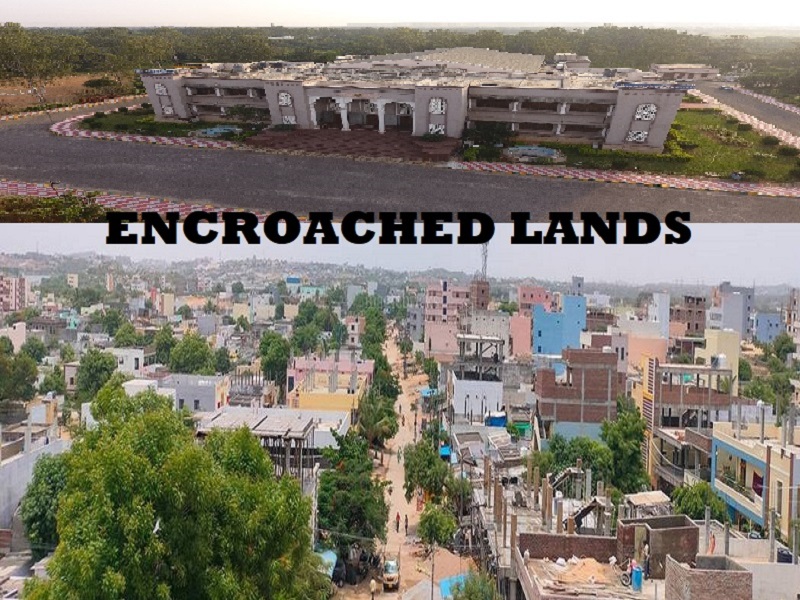Hyderabad, a city known for its rich history and vibrant culture, has recently been embroiled in a series of land grabbing controversies. Among the most prominent cases are the illegal encroachments on the Shivrampally Jagir and Agriculture University Wakf lands.
This narrative explores how political influence and local rowdyism have played significant roles in these illicit activities, affecting acres of valuable land and disrupting communities.
Overview of Shivrampally Jagir
Shivrampally Jagir, located in the southern part of Hyderabad, is a historic estate with vast tracts of fertile land. Originally, this land was intended for agricultural use and community welfare, but over the years, it has become a target for land grabbers. The proximity of Shivrampally to key areas like the Rajiv Gandhi International Airport and the burgeoning IT hubs has dramatically increased the land’s value, making it a lucrative target.
Political Influence and Local Rowdism
The land grabbing in Shivrampally is a classic example of how political influence and local rowdyism can undermine the rule of law. Influential political figures have been implicated in facilitating these encroachments by using their power to manipulate land records and intimidate lawful landowners. Local goons, often employed by these politicians, enforce the illegal takeovers through threats and violence, ensuring that any resistance is swiftly quashed.
Political Party Involvement: Reports have frequently mentioned the involvement of members from prominent political parties like the Bhartiya Rashtra Samithi (BRS) and the All India Majlis-e-Ittehadul Muslimeen (AIMIM). These parties, wielding significant power in the region, have often been accused of shielding the encroachers and exerting pressure on authorities to overlook illegal activities.
One notable incident involved the illegal occupation of around 50 acres in Shivrampally Jagir. This land, worth approximately ₹150 crores in the current market, was forcibly taken from its rightful owners. Local residents of colonies such as Shaheen Nagar and Mailardevpally reported that they were coerced into selling their properties at throwaway prices or were outrightly evicted by thugs acting on behalf of politically connected land sharks.
Agriculture University Wakf Land
The Agriculture University Wakf land, another significant piece of property, has also fallen victim to similar tactics. Wakf properties, which are meant for religious or charitable purposes, are often protected by stringent laws. However, in Hyderabad, these protections have proven inadequate against well-connected encroachers.
In the case of the Agriculture University Wakf land, approximately 100 acres have been illegally occupied over the past few years. These lands, which are conservatively valued at ₹300 crores, were meant to support educational and religious activities. Instead, they have been converted into residential plots and commercial complexes, often under the guise of fake documents and forged permissions.
Colonies like Chintalmet and Attapur have seen a surge in unauthorized constructions on Wakf land. The local community has witnessed the rapid transformation of open spaces into dense residential areas, with plots being sold at prices ranging from ₹40,000 to ₹60,000 per square yard. This illegal development has not only deprived the Wakf board of its rightful assets but has also disrupted the local ecosystem, leading to overcrowding and inadequate infrastructure.
The Role of Authorities
The role of local authorities in these land grabbing cases has been questionable at best. While some officials have attempted to take action, their efforts are often thwarted by the deep-rooted nexus between politicians and land mafias. Corruption within the bureaucracy further complicates matters, as land records are manipulated and court orders are ignored.
Police Cases Booked: Several police cases have been registered against the encroachers, but progress has been slow. Cases under sections of the Indian Penal Code (IPC) such as 420 (cheating), 447 (criminal trespass), and 506 (criminal intimidation) have been filed. However, due to political pressure, many of these cases languish without significant progress.
In Shivrampally Jagir, attempts by the Hyderabad Metropolitan Development Authority (HMDA) to reclaim encroached land have been met with stiff resistance. Demolition drives are often halted midway due to political pressure, and legal battles are dragged out for years, with little hope of resolution.
Community Impact
The impact on local communities has been devastating. Families who have lived on these lands for generations are being uprooted, losing not just their homes but also their livelihoods. The social fabric of neighborhoods like Shaheen Nagar and Mailardevpally is being torn apart as residents are forced to relocate, often without adequate compensation or support.
Environmental degradation is another significant consequence. The unchecked construction on agricultural and Wakf lands has led to a reduction in green spaces, increased pollution, and strain on water resources. The long-term effects on Hyderabad’s sustainability are alarming, as the city grapples with the challenges of urban sprawl.
The land grabbing in Shivrampally Jagir and Agriculture University Wakf lands highlights a grave issue facing Hyderabad today. Political influence and local rowdyism have enabled the illegal occupation of valuable lands, undermining the rights of lawful owners and disrupting communities.
It is imperative for authorities to take stringent action against these encroachments, ensure the protection of vulnerable lands, and restore justice to affected communities. Without decisive intervention, the unchecked greed of a few will continue to overshadow the needs and rights of many, threatening the very fabric of Hyderabad’s heritage and future. #hydkhabar

